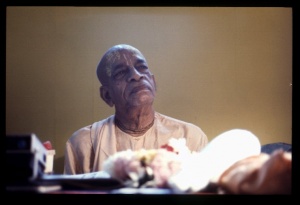SB 10.39.15: Difference between revisions
m (1 revision(s)) |
No edit summary |
||
| Line 1: | Line 1: | ||
{{info | {{info | ||
|speaker= | |speaker=Śukadeva Gosvāmī | ||
|listener=King | |listener=King Parīkṣit | ||
}} | }} | ||
[[Category:Srimad-Bhagavatam - Canto 10 Chapter 39]] | |||
[[Category:Bhagavatam Verses Spoken by Sukadeva Gosvami - Vanisource|103915]] | |||
<div style="float:left">'''[[Srimad-Bhagavatam]] - [[SB 10|Tenth Canto]] - [[SB 10.39: Akrura's vision|Chapter 39: Akrūra's vision]]'''</div> | |||
<div style="float:right">[[File:Go-previous.png|link=SB 10.39.14]] '''[[SB 10.39.14]] - [[SB 10.39.16]]''' [[File:Go-next.png|link=SB 10.39.16]]</div> | |||
{{RandomImage}} | |||
{{SBnotice}} | |||
==== TEXT 15 ==== | ==== TEXT 15 ==== | ||
<div | <div class="verse"> | ||
anyāś ca tad-anudhyāna | :anyāś ca tad-anudhyāna | ||
nivṛttāśeṣa-vṛttayaḥ | :nivṛttāśeṣa-vṛttayaḥ | ||
nābhyajānann imaṁ lokam | :nābhyajānann imaṁ lokam | ||
ātma-lokaṁ gatā iva | :ātma-lokaṁ gatā iva | ||
</div> | </div> | ||
| Line 17: | Line 22: | ||
==== SYNONYMS ==== | ==== SYNONYMS ==== | ||
<div | <div class="synonyms"> | ||
''anyāḥ''—others; ''ca''—and; ''tat''—on Him; ''anudhyāna''—by fixed meditation; ''nivṛtta''—ceased; ''aśeṣa''—all; ''vṛttayaḥ''—their sensory functions; ''na abhyajānan''—they were unaware; ''imam''—of this; ''lokam''—world; ''ātma''—of self-realization; ''lokam''—the realm; ''gatāḥ''—those who have attained; ''iva''—just as. | |||
</div> | </div> | ||
{{SBcollapse}} | |||
==== TRANSLATION ==== | ==== TRANSLATION ==== | ||
<div | <div class="translation"> | ||
Other gopīs entirely stopped their sensory activities and became fixed in meditation on Kṛṣṇa. They lost all awareness of the external world, just like those who attain the platform of self-realization. | Other gopīs entirely stopped their sensory activities and became fixed in meditation on Kṛṣṇa. They lost all awareness of the external world, just like those who attain the platform of self-realization. | ||
</div> | </div> | ||
| Line 31: | Line 36: | ||
==== PURPORT ==== | ==== PURPORT ==== | ||
<div | <div class="purport"> | ||
The gopīs were in fact already on the platform of self-realization. The Caitanya-caritāmṛta ([[CC Madhya 20.108]]) states, jīvera svarūpa haya kṛṣṇera nitya-dāsa: "The self, or individual soul, is an eternal servant of Kṛṣṇa." Thus because they were rendering the most intense loving service to the Lord, the gopīs were situated at the highest stage of self-realization. | The ''gopīs'' were in fact already on the platform of self-realization. The ''Caitanya-caritāmṛta'' ([[CC Madhya 20.108-109|''Madhya'' 20.108]]) states, ''jīvera svarūpa haya kṛṣṇera nitya-dāsa:'' "The self, or individual soul, is an eternal servant of Kṛṣṇa." Thus because they were rendering the most intense loving service to the Lord, the ''gopīs'' were situated at the highest stage of self-realization. | ||
</div> | </div> | ||
__NOTOC__ | </div> | ||
</div> | |||
<div style="float:right">[[File:Go-previous.png|link=SB 10.39.14]] '''[[SB 10.39.14]] - [[SB 10.39.16]]''' [[File:Go-next.png|link=SB 10.39.16]]</div> | |||
__NOTOC__ | |||
__NOEDITSECTION__ | |||
Revision as of 05:34, 23 May 2021

A.C. Bhaktivedanta Swami Prabhupada
Please note: The synonyms, translation and purport of this verse were composed by disciples of Śrīla Prabhupāda
TEXT 15
- anyāś ca tad-anudhyāna
- nivṛttāśeṣa-vṛttayaḥ
- nābhyajānann imaṁ lokam
- ātma-lokaṁ gatā iva
SYNONYMS
anyāḥ—others; ca—and; tat—on Him; anudhyāna—by fixed meditation; nivṛtta—ceased; aśeṣa—all; vṛttayaḥ—their sensory functions; na abhyajānan—they were unaware; imam—of this; lokam—world; ātma—of self-realization; lokam—the realm; gatāḥ—those who have attained; iva—just as.
Translation and purport composed by disciples of Śrīla Prabhupāda
TRANSLATION
Other gopīs entirely stopped their sensory activities and became fixed in meditation on Kṛṣṇa. They lost all awareness of the external world, just like those who attain the platform of self-realization.
PURPORT
The gopīs were in fact already on the platform of self-realization. The Caitanya-caritāmṛta (Madhya 20.108) states, jīvera svarūpa haya kṛṣṇera nitya-dāsa: "The self, or individual soul, is an eternal servant of Kṛṣṇa." Thus because they were rendering the most intense loving service to the Lord, the gopīs were situated at the highest stage of self-realization.